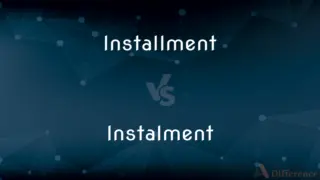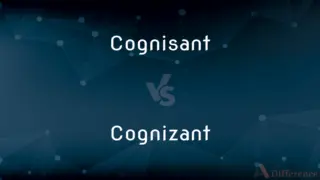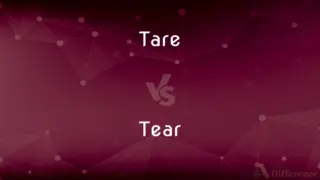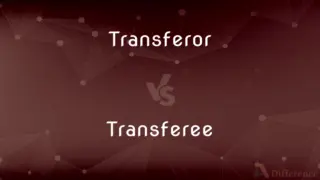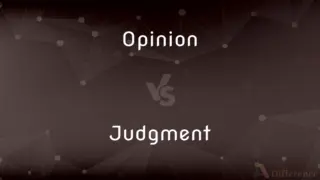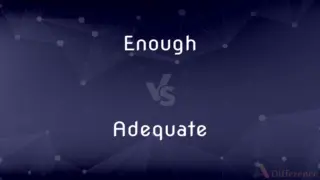Effectuate vs. Effect — What's the Difference?
By Maham Liaqat & Urooj Arif — Updated on March 26, 2024
Effectuate means to bring something about or to cause it to happen, whereas effect refers to the result or outcome of an action.
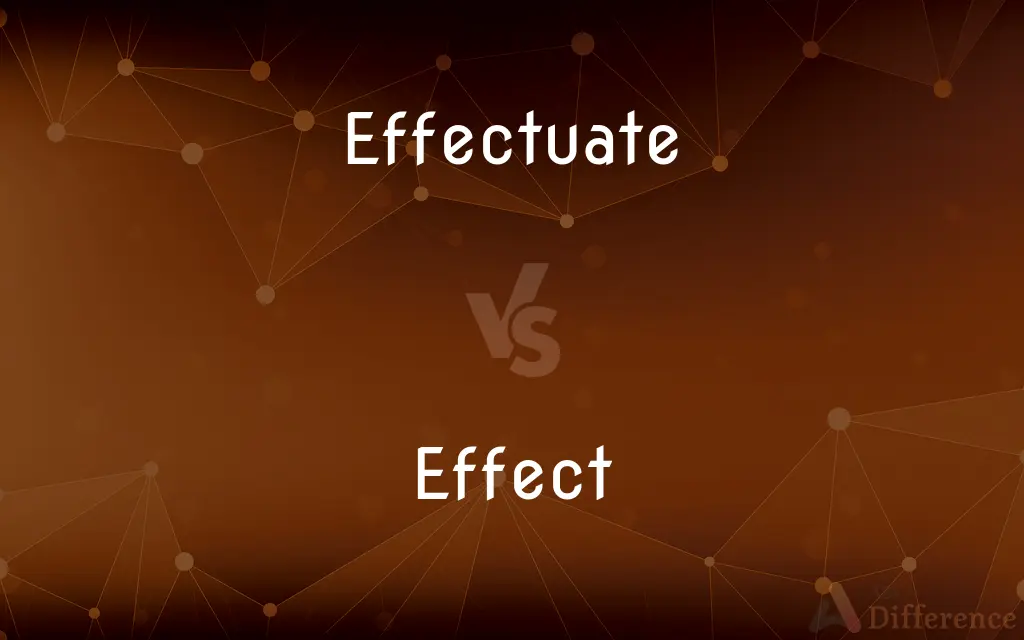
Difference Between Effectuate and Effect
Table of Contents
ADVERTISEMENT
Key Differences
Effectuate is a verb that emphasizes the action of causing something to occur or making it happen through deliberate efforts. It suggests an active role in implementing or executing actions that lead to a particular result or change. On the other hand, effect, when used as a noun, refers to the change that results from a particular action or cause. It focuses on the outcome or consequence rather than the process of bringing that outcome about.
While effectuate involves the process or actions taken to achieve an outcome, effect deals with the end result of those actions. For example, a policy maker might effectuate changes in legislation, with the effect being the actual changes in law that come about as a result. Effectuate requires an agent or actor who takes steps to bring about a change, whereas effect does not imply any action but is the result of actions taken.
Effectuate is often used in contexts where there is a clear intention and effort to cause a specific outcome, highlighting the effectiveness and influence of the actions taken. Effect, in contrast, is used to describe the impact or significance of an action, without specifying the effort or process involved in causing it.
The distinction also lies in their usage in sentences; effectuate is used as a verb indicating the action of bringing about a result, while effect is a noun that names the outcome itself. This difference in grammatical function reinforces the conceptual difference between the process of causing a change and the change that results.
In practical terms, to effectuate a policy means to implement or execute actions that make the policy take effect, while the effect of the policy would be the actual impact it has once it is in place. The former emphasizes the role of human agency and effort, while the latter focuses on the outcomes of those efforts.
ADVERTISEMENT
Comparison Chart
Part of Speech
Verb
Noun
Definition
To cause something to happen or bring it about.
The result or outcome of a cause or action.
Focus
On the process of causing or implementing.
On the outcome or consequence of an action.
Usage
Used to describe deliberate actions to achieve an outcome.
Used to describe the impact or result of actions.
Example
Effectuating policy changes requires strategic planning.
The effect of the new policy was increased transparency.
Compare with Definitions
Effectuate
Often used in formal or technical contexts.
The agreement was designed to effectuate economic cooperation between the countries.
Effect
The result or outcome of an action or cause.
The effect of the new law was immediately felt across the industry.
Effectuate
To bring about a specific outcome through deliberate actions.
The CEO aimed to effectuate organizational changes to improve efficiency.
Effect
Does not imply action by itself.
The speech had a profound effect on the audience.
Effectuate
Involves active and intentional efforts.
They worked hard to effectuate a shift in public opinion.
Effect
Used to discuss impacts or consequences.
The environmental effects of pollution are a growing concern.
Effectuate
Focuses on the process leading to a result.
To effectuate the project's success, meticulous planning was essential.
Effect
A broader term, applicable in various contexts.
The drug has several side effects.
Effectuate
Implies effectiveness in causing change.
The intervention was able to effectuate positive behavioral changes in the participants.
Effect
Can refer to a specific change that has occurred.
The greenhouse effect contributes to global warming.
Effectuate
Put into force or operation
School choice would effectuate a transfer of power from government to individuals
Effect
Something brought about by a cause or agent; a result.
Effectuate
To bring about; effect.
Effect
The power to produce an outcome or achieve a result
The government's action had little effect on the trade imbalance.
Effectuate
(transitive) To cause, bring about (an event); to accomplish, to carry out (a wish, plan etc.).
Effect
Advantage; avail
Used her words to great effect in influencing the jury.
Effectuate
To bring to pass; to effect; to achieve; to accomplish; to fulfill.
A fit instrument to effectuate his desire.
In order to effectuate the thorough reform.
Effect
The condition of being in full force or execution; operativeness
A new regulation that goes into effect tomorrow.
Effectuate
Produce;
The scientists set up a shockwave
Effect
Something that produces a specific impression or supports a general design or intention
The lighting effects emphasized the harsh atmosphere of the drama.
Effect
A particular impression
Large windows that gave an effect of spaciousness.
Effect
Production of a desired impression
Spent lavishly on dinner just for effect.
Effect
The basic or general meaning; import
He said he was greatly worried, or words to that effect.
Effect
Effects Movable belongings; goods.
Effect
To bring about; make happen; cause or accomplish
Effect a cure for a disease.
Effect a change in policy. See Usage Note at affect1.
Effect
The result or outcome of a cause.
The effect of the hurricane was a devastated landscape.
Effect
Impression left on the mind; sensation produced.
Effect
Execution; performance; realization; operation.
Effect
(uncountable) The state of being binding and enforceable, as in a rule, policy, or law.
The new law will come into effect on the first day of next year.
Effect
An illusion produced by technical means (as in "special effect")
The effect of flying was most convincing.
Effect
(sound engineering) An alteration, or device for producing an alteration, in sound after it has been produced by an instrument.
I use an echo effect here to make the sound more mysterious.
I just bought a couple of great effects.
Effect
A scientific phenomenon, usually named after its discoverer.
Doppler effect
Effect
Belongings, usually as personal effects.
Effect
Consequence intended; purpose; meaning; general intent; with to.
Effect
(obsolete) Reality; actual meaning; fact, as distinguished from mere appearance.
Effect
(obsolete) Manifestation; expression; sign.
Effect
(transitive) To make or bring about; to implement.
The best way to effect change is to work with existing stakeholders.
Effect
Misspelling of affect
Effect
Execution; performance; realization; operation; as, the law goes into effect in May.
That no compunctious visitings of natureShake my fell purpose, nor keep peace betweenThe effect and it.
Effect
Manifestation; expression; sign.
All the large effectsThat troop with majesty.
Effect
In general: That which is produced by an agent or cause; the event which follows immediately from an antecedent, called the cause; result; consequence; outcome; fruit; as, the effect of luxury.
The effect is the unfailing index of the amount of the cause.
Effect
Impression left on the mind; sensation produced.
Patchwork . . . introduced for oratorical effect.
The effect was heightened by the wild and lonely nature of the place.
Effect
Power to produce results; efficiency; force; importance; account; as, to speak with effect.
Effect
Consequence intended; purpose; meaning; general intent; - with to.
They spake to her to that effect.
Effect
The purport; the sum and substance.
Effect
Reality; actual meaning; fact, as distinguished from mere appearance.
No other in effect than what it seems.
Effect
Goods; movables; personal estate; - sometimes used to embrace real as well as personal property; as, the people escaped from the town with their effects.
Resolving all events, with their effectsAnd manifold results, into the willAnd arbitration wise of the Supreme.
Shun the bitter consequence, for know,The day thou eatest thereof, . . . thou shalt die.
Effect
To produce, as a cause or agent; to cause to be.
So great a body such exploits to effect.
Effect
To bring to pass; to execute; to enforce; to achieve; to accomplish.
To effect that which the divine counsels had decreed.
They sailed away without effecting their purpose.
Effect
A phenomenon that follows and is caused by some previous phenomenon;
The magnetic effect was greater when the rod was lengthwise
His decision had depressing consequences for business
He acted very wise after the event
Effect
An outward appearance;
He made a good impression
I wanted to create an impression of success
She retained that bold effect in her reproductions of the original painting
Effect
(of a law) having legal validity;
The law is still in effect
Effect
A symptom caused by an illness or a drug;
The effects of sleep loss
The effect of the anesthetic
Effect
An impression (especially one that is artificial or contrived);
He just did it for effect
Effect
The central meaning or theme of a speech or literary work
Effect
Produce;
The scientists set up a shockwave
Effect
Act so as to bring into existence;
Effect a change
Common Curiosities
How does effect differ from effectuate?
Effect refers to the outcome or result of actions, whereas effectuate refers to the process of causing those outcomes through deliberate actions.
Can someone effectuate an effect?
Yes, someone can effectuate an effect by taking actions that lead to a particular result or outcome.
Is effectuate commonly used in everyday language?
Effectuate is less common in everyday language and is more often used in formal or technical contexts to describe the process of implementing changes.
What does it mean to effectuate something?
To effectuate something means to actively bring it about or make it happen through deliberate efforts.
Can an effect exist without someone effectuating it?
Yes, effects can result from natural causes or events without deliberate human action, whereas effectuating something always involves human agency.
What is an example of an effect that does not require effectuation?
Natural phenomena, like the effect of gravity, do not require effectuation as they occur without deliberate human intervention.
How can policymakers effectuate change?
Policymakers can effectuate change by developing, adopting, and implementing policies that aim to achieve specific outcomes.
What role does intention play in effectuating an outcome?
Intention is crucial in effectuating outcomes, as it involves deliberate actions aimed at bringing about specific results.
Can technology effectuate social change?
Yes, technology can effectuate social change by enabling new forms of communication, access to information, and altering social dynamics.
Can effectuate be used in a negative context?
Yes, effectuate can be used in negative contexts, such as effectuating a plan that leads to harmful outcomes.
Can the same action effectuate different effects?
Yes, the same action can lead to multiple effects, depending on the context and conditions under which it is taken.
How does understanding the difference between effectuate and effect help in communication?
Understanding the difference helps clarify whether one is discussing the process of causing change (effectuate) or the outcome of such processes (effect).
What is the relationship between cause and effect in the context of effectuation?
In the context of effectuation, the cause is the deliberate action taken to bring about a change, while the effect is the result or outcome of that action.
Does the effect of an action always match the intended outcome of effectuating it?
No, the actual effect of an action may not always match the intended outcome due to various unforeseen factors.
How important is planning in effectuating change?
Planning is very important in effectuating change, as it involves deliberate and strategic actions designed to achieve specific outcomes.
Share Your Discovery

Previous Comparison
Tear vs. Tears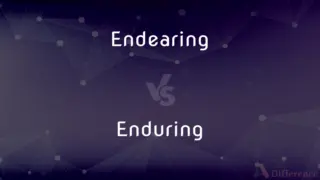
Next Comparison
Endearing vs. EnduringAuthor Spotlight
Written by
Maham LiaqatCo-written by
Urooj ArifUrooj is a skilled content writer at Ask Difference, known for her exceptional ability to simplify complex topics into engaging and informative content. With a passion for research and a flair for clear, concise writing, she consistently delivers articles that resonate with our diverse audience.








